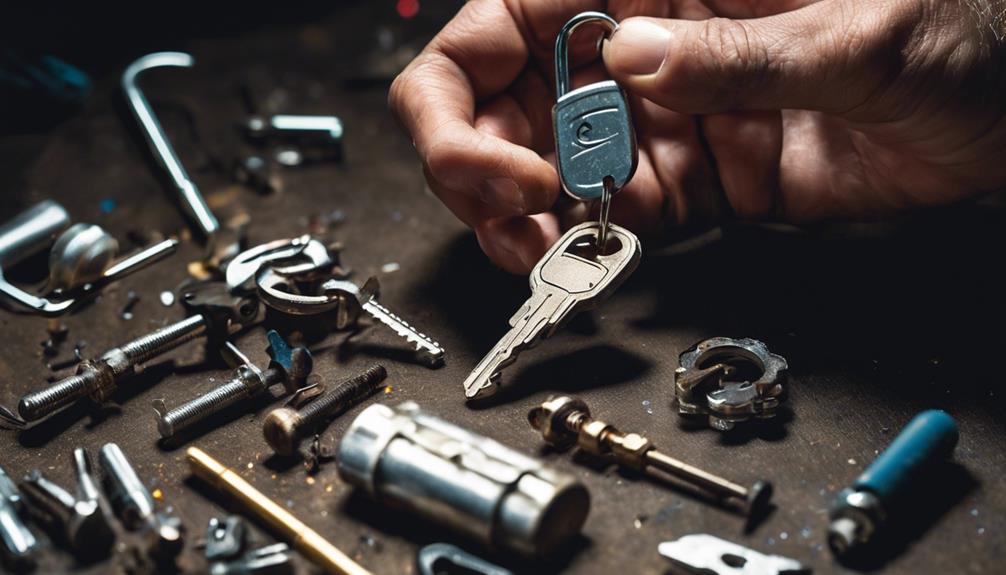When you're re-keying car locks, you might face a few common issues. You could struggle with removing the lock cylinder due to dirt or corrosion. Choosing the wrong key blank can complicate things further, leading to ignition problems. Misaligned pins and damaged components can hinder your progress, causing the lock to malfunction. Additionally, insufficient tension on the key can prevent proper operation. Don't forget about compatibility with your key fob; failures here might leave you locked out. By understanding these challenges, you're already on the right path to a smooth re-keying experience. There's more to uncover about solutions, though.
Key Takeaways
- Stuck lock cylinders may require penetrating oil and patience for removal, often due to dirt or corrosion.
- Ensuring correct key blank selection is crucial; incorrect blanks can lead to ignition problems and non-functional keys.
- Misaligned pins can hinder lock functionality; proper tools and techniques are necessary for alignment during re-keying.
- Insufficient key tension can prevent proper pin alignment; consistent pressure is essential during the re-keying process.
- Compatibility with key fobs and security features like transponder keys may require reprogramming after re-keying to ensure access.
Difficulty Removing Lock Cylinder
When you attempt to remove the lock cylinder from your car, you might encounter unexpected challenges. These difficulties can stem from various car lock rekeying problems that catch you off guard. One common issue is a stuck cylinder, which can result from dirt or corrosion. If you're facing this, consider using a penetrating oil to help loosen it up before trying again.
Additionally, if you're unsure about the rekeying process, refer to a thorough guide for mastering car lock re-keying.
Another factor in troubleshooting car rekeying is ensuring you have the right tools. Using the wrong tools can make removal nearly impossible and lead to automotive lock rekeying issues. A flathead screwdriver or a specialized lock removal tool will often do the trick, but make sure you're using them properly to avoid damaging the cylinder.
Additionally, pay close attention to the locking mechanism itself. If it's malfunctioning, you may need to troubleshoot further before attempting to remove the cylinder.
Sometimes, a little patience and creativity can go a long way in overcoming these challenges. Remember, taking the time to address these issues thoughtfully can help you serve the needs of others who rely on your expertise in lock rekeying.
Incorrect Key Blank Selection
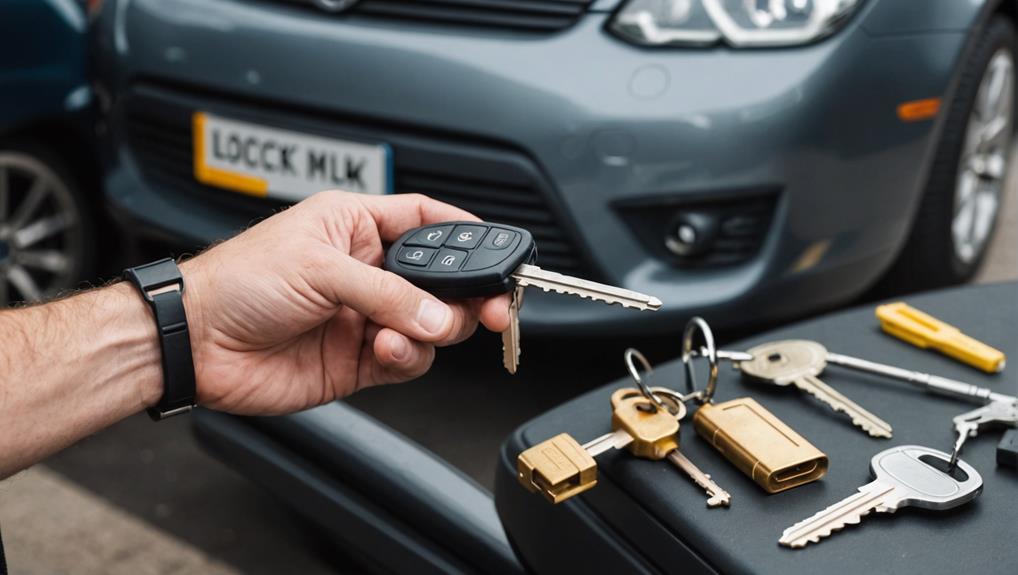
When re-keying your car locks, choosing the wrong key blank can lead to frustrating complications.
It's crucial to understand the specifications of your vehicle's lock system to avoid costly mistakes. You need to verify that the key blank is compatible with your vehicle's ignition cylinder and adheres to manufacturer specifications.
Ignoring these details could result in a key that simply won't work.
For more information on DIY versus professional re-keying, consider the potential risks and benefits involved.
Key Blank Compatibility
Selecting the right key blank is vital for effective re-keying of car locks. If you choose an incorrect key blank, you might face significant rekeying ignition problems. Not all key blanks are created equal, and using one that doesn't match your lock type can lead to frustration and wasted time.
To avoid these pitfalls, it's important to do your research before starting the re-keying process. Check your vehicle's specifications or consult with a professional to verify you're selecting the correct key blank. This way, you'll not only save yourself from rekeying ignition problems but also enhance your ability to serve others who may need similar assistance.
When you're equipped with the right key blank, your car lock rekeying efforts will be much smoother. Remember, having the proper tools, including the right key blank, is one of the key car lock rekeying tips that can make a significant difference in your project's success.
Ignition Cylinder Differences
Understanding ignition cylinder differences is essential to preventing issues during the re-keying process. When you're working on a vehicle's locks, it's vital to select the correct key blank that matches the ignition cylinder. Using an incorrect key blank can lead to frustrating situations; the key may not fit at all or could damage the ignition system.
Every ignition cylinder is designed with specific cuts and dimensions that align with its corresponding key blank. If you choose a blank that doesn't match, you risk creating a key that won't turn the cylinder or, worse, one that breaks off inside, leaving you stranded.
You want to guarantee that you're not only serving your client's needs but also maintaining the integrity of their vehicle's locking system.
To avoid these pitfalls, familiarize yourself with the different types of ignition cylinders and the key blanks that fit them. Double-check compatibility before proceeding. By doing so, you help others enjoy the peace of mind that comes with having a reliable vehicle, and you build trust in your expertise as a locksmith.
Manufacturer Specifications Importance
Choosing the right key blank according to manufacturer specifications is crucial for a successful re-keying process. When you select the wrong key blank, you risk creating more problems than solutions. Each manufacturer designs their key blanks with specific cuts and dimensions that fit precisely within their locks. If you use an incorrect blank, it may not turn smoothly or could even jam the lock.
To serve others effectively, always consult the vehicle's manual or a reliable database for the correct key blank. This guarantees you're equipped with the right information to help your clients. Additionally, using the right blank minimizes wear on the lock mechanism, prolonging its life and preventing future issues.
If you mistakenly choose an incompatible key blank, you might end up needing to replace the entire locking mechanism, which can be costly for your clients. Don't let that happen! By paying close attention to manufacturer specifications, you can provide a reliable service that builds trust and satisfaction among those you serve.
Misalignment of Pins
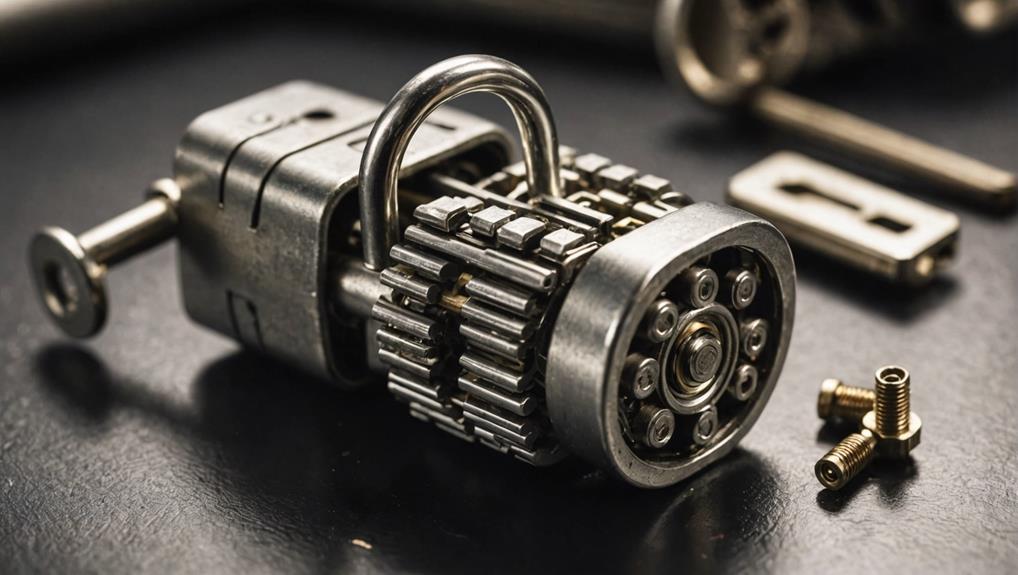
When re-keying your car locks, misalignment of pins can cause significant issues.
This misalignment often stems from improper installation or wear over time, directly impacting your lock's functionality.
To guarantee proper alignment, it's crucial to use the correct tools and techniques, similar to mastering motorcycle and scooter lock re-keying techniques.
Fortunately, there are effective solutions to realign the pins and restore your lock's performance.
Causes of Misalignment
Misalignment of pins in car locks can lead to frustrating complications during the re-keying process. Understanding the causes of this misalignment can help you provide better service to your clients and guarantee their satisfaction.
One common cause is improper pin selection. If the pins don't match the key cuts precisely, they may not align correctly within the lock, making it difficult for the key to turn smoothly.
Another factor is wear and tear. Over time, locks can become worn, causing the pins to shift out of alignment. This can happen due to frequent use, exposure to weather elements, or even lack of maintenance.
Incorrect installation of the lock can also be a culprit. If a lock isn't positioned properly in the door, the pins may not align with the keyway, leading to complications during operation.
Impact on Functionality
The misalignment of pins in car locks can greatly impact their overall functionality. When you attempt to re-key a lock, even the slightest misalignment can lead to significant issues. If the pins aren't seated properly, it can prevent the key from turning smoothly, causing frustration and inconvenience.
Here are some effects you might notice:
- Difficulty in Locking/Unlocking: A misaligned lock can make it hard to turn the key, forcing you to apply excessive force.
- Increased Wear: Constant struggle to operate the lock can lead to faster wear and tear, potentially damaging the lock mechanism.
- Security Risks: A lock that doesn't function correctly may compromise your vehicle's security, making it easier for unauthorized access.
- Costly Repairs: Ignoring minor misalignments can lead to more significant problems, resulting in expensive repairs or replacements.
Being aware of these issues is vital for anyone looking to serve others effectively. By understanding how misalignment impacts functionality, you can take the right steps to guarantee that the locks work efficiently, thereby enhancing the safety and convenience for everyone involved.
Solutions for Resolution
To effectively resolve misalignment of pins in car locks, start by carefully disassembling the lock to inspect any visible issues.
Look for pins that aren't seated properly or have fallen out of alignment. This initial assessment is vital, as it helps you identify exactly where the problem lies.
Once you've pinpointed the misaligned pins, gently reposition them using a small tool, like tweezers or a pick.
Confirm they're aligned with the lock chamber correctly. If a pin appears damaged or worn, replace it with a new one to guarantee peak performance.
After adjusting the pins, reassemble the lock and test its functionality.
Insert the key slowly to see if it turns smoothly without resistance. If it still feels stuck, you may need to disassemble the lock again and double-check your adjustments.
Damaged Lock Components
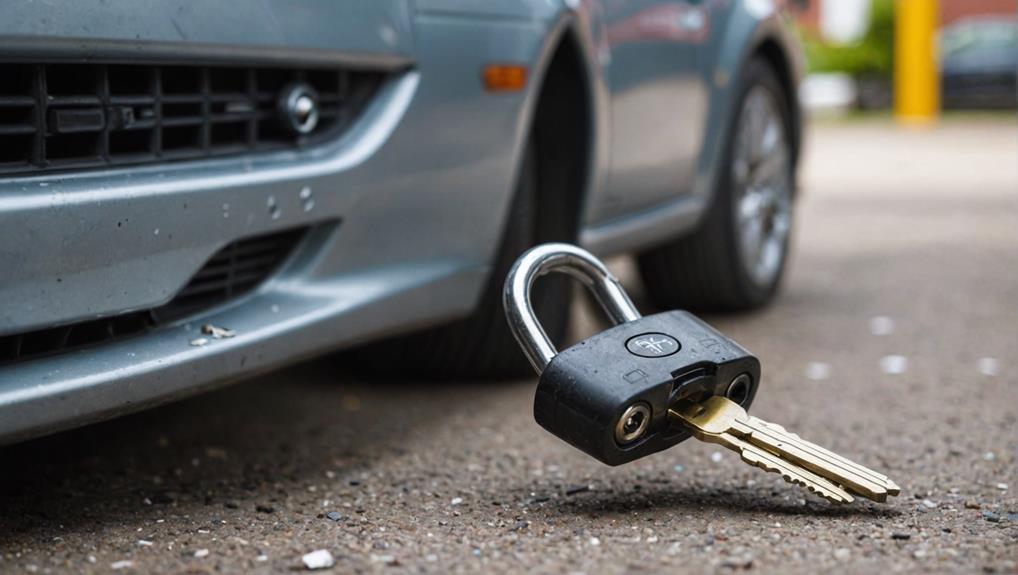
When you attempt to re-key your car locks, damaged lock components can create significant hurdles. Understanding the importance of lock re-keying benefits is vital to guarantee a successful process.
If you're looking to serve others by helping them secure their vehicles, it's important to recognize how these issues can derail your efforts. A damaged lock can lead to frustrating complications, leaving you and your client feeling stuck.
Here are some common damaged components you might encounter:
- Worn-out Pins: Over time, pins can become ineffective, compromising the lock's security.
- Broken Springs: Springs can wear down or break, affecting the lock's functionality.
- Corroded Cylinder: Rust and corrosion can hinder smooth operation and make re-keying impossible.
- Misaligned Components: If parts are misaligned, even a new key won't work properly.
Addressing these issues is important for a successful re-keying process. Before you start, inspect the lock thoroughly and consider replacing any damaged parts.
This guarantees that your service not only meets the current needs but also enhances the overall security of the vehicle. By being proactive about lock components, you're not just fixing a problem; you're providing peace of mind to those you serve.
Insufficient Key Tension
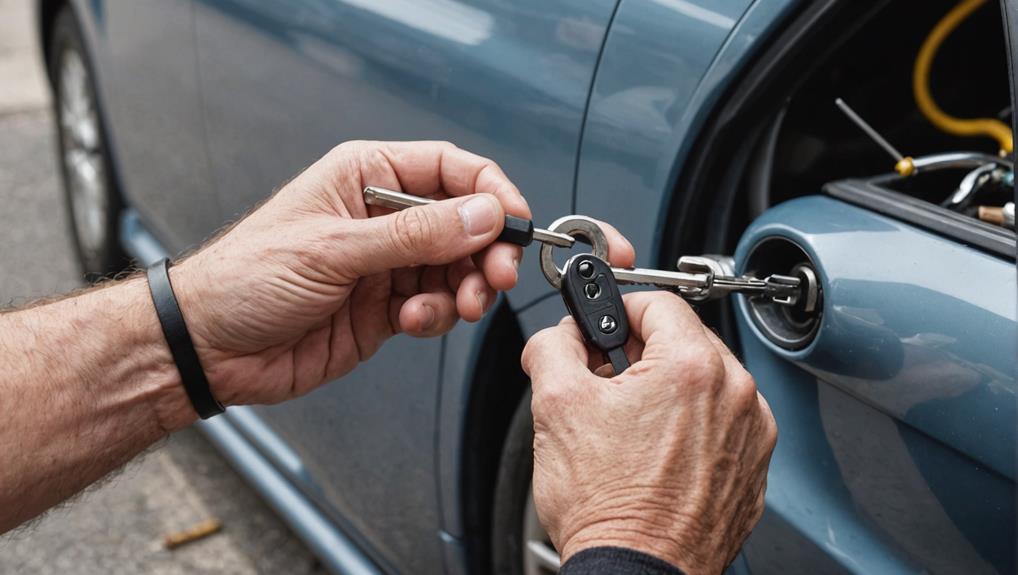
Insufficient key tension can greatly hinder your efforts during the re-keying process. When you lack the right tension, the pins in the lock cylinder mightn't align properly, preventing the key from turning smoothly. This can be frustrating, especially when you're trying to provide a seamless service to someone in need.
Understanding the cost comparison between DIY and professional re-keying can also help you determine the best approach for your situation.
To overcome this challenge, it's essential to apply consistent pressure on the key while you're working. If you're too gentle, the pins may not fully engage at the shear line, and if you're too forceful, you risk damaging the lock or the new key. It's a delicate balance, but with practice, you can master it.
Also, be aware that different locks may require varying levels of tension. Take the time to familiarize yourself with the specific lock you're working on, as this knowledge can greatly improve your efficiency.
Improper Rekeying Tools
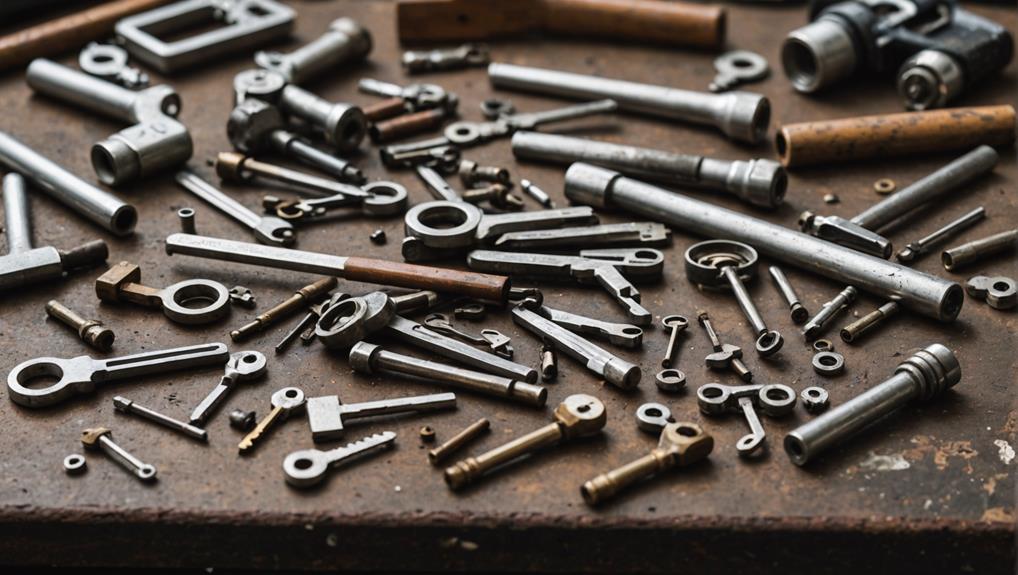
Using the wrong rekeying tools can throw a wrench in the entire process, leading to frustrating delays. When you're attempting to rekey car locks, having the right tools is vital for achieving a smooth and efficient outcome.
Proper tools are essential for both DIY enthusiasts and professionals alike, as they guarantee precision and effectiveness in the rekeying process. If you use improper tools, it can't only hinder your progress but also risk damaging the lock or the new key.
Essential tools for rekeying can make all the difference in avoiding these issues.
Here are some common improper tools that can create issues:
- Wrong-sized tension wrenches: They won't apply the correct pressure, making it hard to turn the lock.
- Incompatible pinning kits: Using kits meant for different lock types can lead to mismatched pins and cylinders.
- Substandard picks: Cheap or poorly designed picks can break inside the lock, complicating the process further.
- Inaccurate key gauges: These can mislead you about the key's specifications, resulting in errors.
To serve others effectively, confirm you're equipped with the right tools. This not only makes the rekeying process smoother but also helps build trust with your clients, knowing you're committed to quality service.
Incompatibility With Key Fob
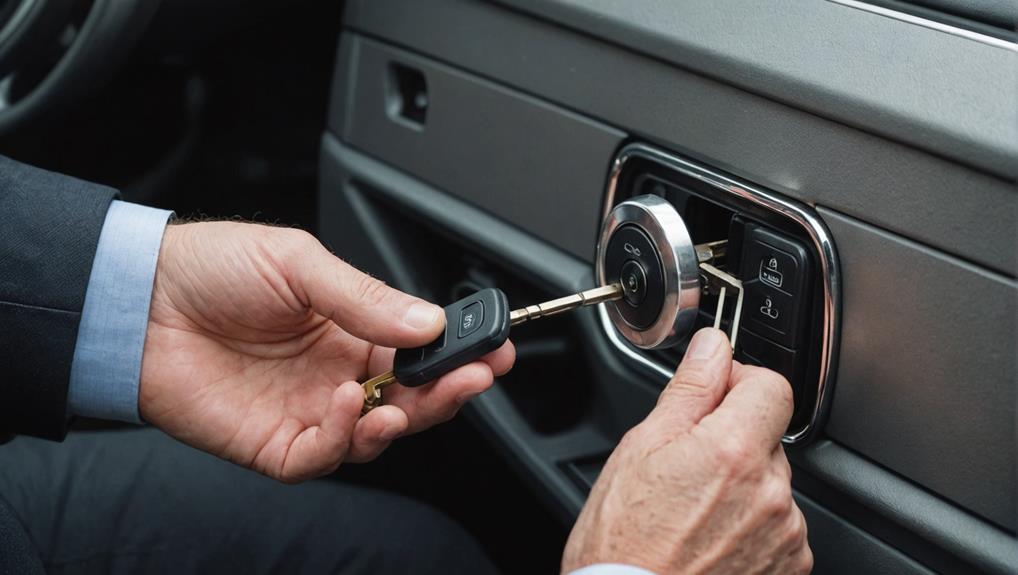
Many car owners overlook the essential aspect of key fob compatibility during the rekeying process. If you've recently rekeyed your car locks but your fob isn't working, you could be left stranded without access to your vehicle. This can lead to frustration, especially if you rely on your key fob for convenience.
Here's a quick overview to help you understand key fob compatibility issues:
| Issue | Description | Solution |
|---|---|---|
| Key Fob Programming | Fobs may need reprogramming after rekeying. | Consult a professional locksmith. |
| Different Frequencies | New locks might use different signal frequencies. | Verify frequency compatibility. |
| Battery Issues | Weak batteries can cause fob malfunctions. | Replace batteries regularly. |
Before rekeying, it's wise to check if your key fob will still be compatible. If not, you may need to invest in reprogramming or a new fob altogether. By addressing this concern early, you'll guarantee smooth access to your vehicle and avoid unnecessary hassles later.
Ignition Lock Issues
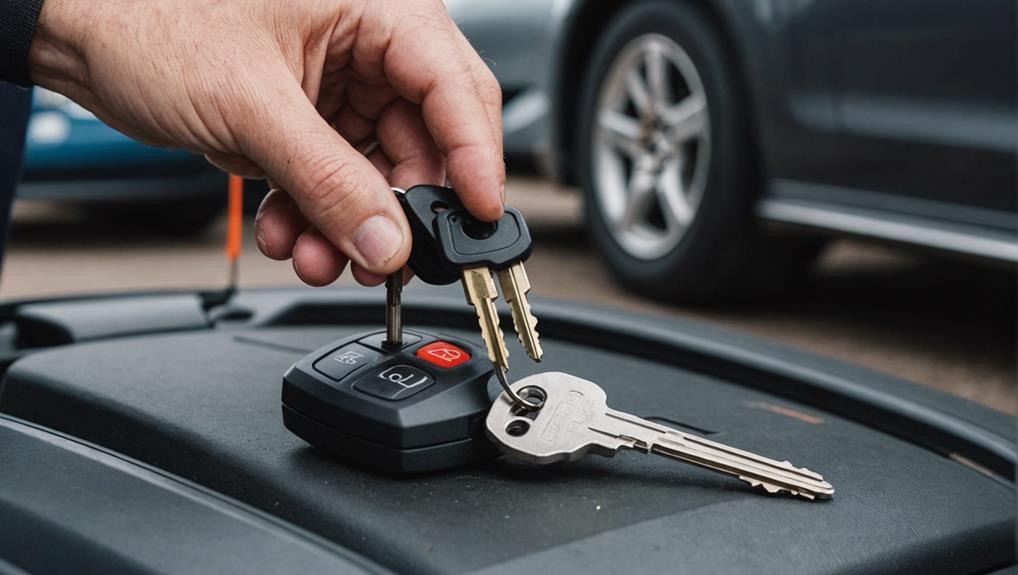
Rekeying car locks can sometimes lead to unexpected ignition lock issues that might leave you frustrated and unable to start your vehicle. When you've invested time and effort into rekeying, the last thing you want is additional complications.
Opting for low-cost locksmith services can exacerbate these problems, as cheaper options may lack the quality and expertise needed for proper rekeying, potentially leading to a host of unforeseen ignition issues the risks of cheap services.
Common ignition lock issues can arise, impacting your driving experience and your ability to serve others effectively.
Here are some key problems you might encounter:
- Stiff ignition cylinder: This can make turning the key difficult, causing unnecessary stress.
- Key not turning: If the new key isn't working properly, it can leave you stranded and in need of assistance.
- Intermittent connectivity: Sometimes, the ignition may respond inconsistently, leading to uncertainty when starting.
- Wrong key compatibility: Confirm that the new key matches the ignition lock precisely; otherwise, it could lead to further complications.
Addressing these ignition lock issues promptly is vital. If you notice any of these problems, consider consulting a professional locksmith to guarantee that your vehicle remains reliable and ready to serve you and others at all times.
Security Features Complications
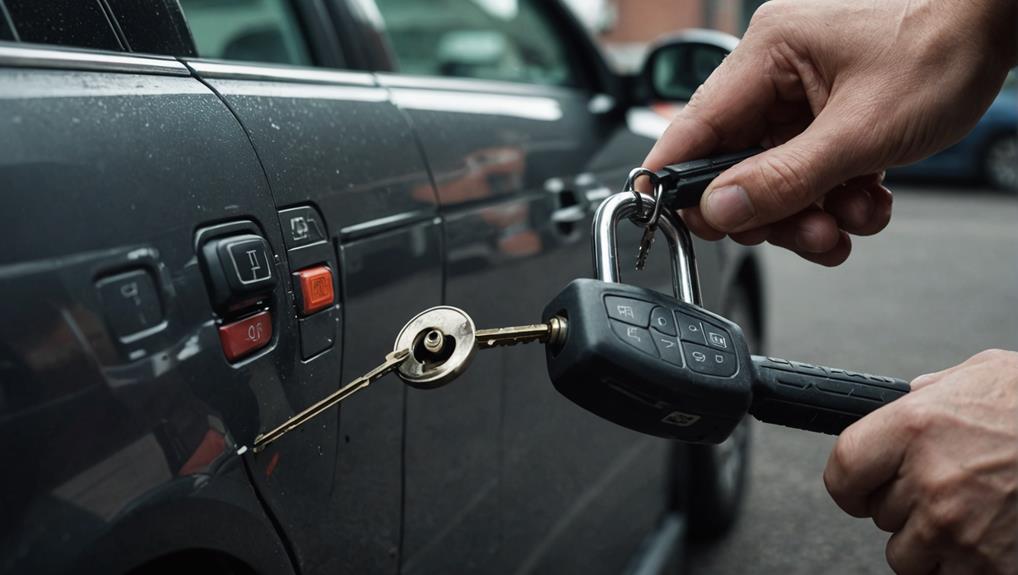
When it comes to rekeying car locks, unexpected complications with security features can arise, adding another layer of frustration to the process. Many modern vehicles come equipped with advanced locking systems designed to deter theft, but these features can make rekeying more challenging than you might expect.
Here's a quick overview of common security features that could complicate your rekeying efforts:
| Security Feature | Potential Complication |
|---|---|
| Transponder Keys | Requires reprogramming after rekeying |
| Keyless Entry Systems | May need dealer intervention |
| Immobilizers | Engine won't start without proper coding |
| Electronic Locking | Must sync with vehicle's computer |
| Anti-theft Alarms | Can trigger if not reset properly |
Navigating these security features can be tricky, but understanding them can help you serve your clients better. Always consult the vehicle's manual or a professional locksmith when dealing with these complexities. By staying informed, you can guarantee a smoother rekeying experience while keeping your clients' vehicles safe and secure.
Frequently Asked Questions
How Often Should I Re-Key My Car Locks?
You should consider re-keying your car locks whenever you lose your keys, buy a used vehicle, or suspect someone might've unauthorized access.
It's also a good idea to re-key if you've had a break-in or if your keys have been stolen.
Regularly evaluating your security can help you decide when it's time for a change.
Keeping your car safe is a priority, so don't hesitate to take action when needed.
Can I Re-Key My Locks Without Professional Help?
You've just found your keys missing, and you feel that familiar pang of worry.
Yes, you can re-key your locks without professional help, but it's not always easy. If you're handy and have the right tools, you can follow online guides to get it done.
Just remember, though, that a secure lock is essential for your safety and others. If you're unsure, it's wise to call in a pro to guarantee everything's done right.
What Tools Do I Need for Re-Keying Car Locks?
To re-key car locks, you'll need a few essential tools.
First, grab a re-keying kit specific to your lock type. You'll also need a screwdriver to remove the lock, a pair of pliers for handling small parts, and a clean workspace to keep everything organized.
If you have a flashlight, it can help you see inside the lock better.
With these tools, you're on your way to successfully re-keying your car locks!
Are All Car Locks Re-Keyable?
Not all car locks are re-keyable, and you'll find that some locks are designed specifically for a single key.
If you're looking to enhance security, you might consider replacing the entire lock or cylinder instead.
When re-keying is possible, you'll guarantee the new keys work smoothly, allowing you to serve your vehicle's needs efficiently.
Always check with a professional or refer to your vehicle's manual to confirm re-keying options.
How Long Does the Re-Keying Process Take?
The re-keying process usually takes about 30 minutes to an hour, depending on the complexity of your car's lock system.
You'll want to find a skilled locksmith who can efficiently handle the task.
While you're waiting, you can ask questions or learn more about their services.
Once the job's done, you'll have peace of mind knowing your keys are unique to you, providing added security for your vehicle.
Conclusion
Re-keying your car locks can feel like trying to navigate a maze blindfolded—frustrating and confusing. Remember, even seasoned locksmiths run into issues like misaligned pins or damaged components. If you hit a snag, don't hesitate to reach out for professional help. Just like a well-tuned engine, sometimes you need an expert to keep everything running smoothly. By addressing these common pitfalls, you can regain access to your vehicle and drive with peace of mind.

